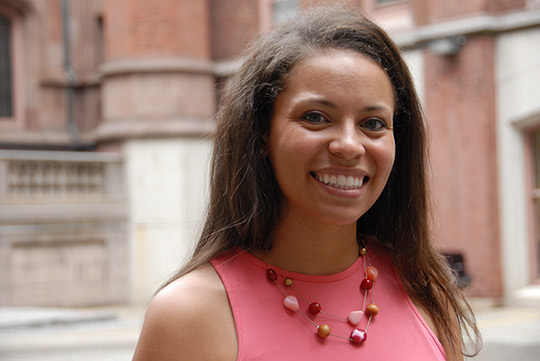Her Choice to Change the World
Like her illustrious ancestor, Amanda Washington is trying to fix more than the classroom for poor students of color
By JOE LEVINE
In summer 2009, while working for Teach for America in a low-income public high school in Philadelphia, Amanda Washington was interrupted by a student. “He said, ‘Ms. Washington, it’s great what you’re trying to do, but we all understand that we’re not going anywhere because we’re black,’” recalls Washington, now a TC education policy student.
For Washington — the great-great granddaughter of Booker T. Washington — the moment framed a challenge in historical terms. “My great-great grandfather couldn’t attend school because he had to help support his family,” says Washington, whose mother and father are, respectively, a pediatric neurologist and a doctor of internal medicine. “So he decided to educate himself by any legitimate means. I think his message today would be the same. So it was heartbreaking that these kids had internalized the belief that they couldn’t be more than what some people have told them.”
As a seven-year-old, Washington set out with her father on foot to retrace the 200-mile trek that Booker and his family made after they were emancipated as slaves. The latter-day Washingtons turned around after 20 miles, but Amanda’s life’s journey was just beginning. On her 13th birthday, family friend Oliver Hill, a former lead counsel for Virginia plaintiffs in the landmark desegregation case Brown v. Board of Education, gave her an atlas inscribed “To Amanda: You’re going to inspire people and change the world.”
In 11th grade, Washington conducted a study, later referenced by Hill and others, comparing two local public high schools. One, in the suburbs, boasted cutting-edge facilities and provided students with Apple laptops. At the other, an urban school, students couldn’t take textbooks home at night.
Washington attended Spelman College, the nation’s oldest historically black college for women (tag line: “a choice to change the world”), and then earned a master’s degree in TESOL from American University School of Education, Teaching and Health.
Then came her trials by fire in the public schools, where one girl responded to her persistent outreach by cursing and hurling objects at her. “She later told me she’d never had an educator that she sensed genuinely cared about her progress,” Washington recalls. “When she said she wanted to go to Yale and pursue a Ph.D., it made me want to do more.”
At TC, Washington has taken courses in law and educational equity with Michael Rebell, Jay Heubert, Jeffrey Henig and Carolyn Riehl. “During the first week, Professor Rebell talked about many of the challenges I’d encountered as a teacher, including debilitating issues of race, poverty, health care and school funding.”
Washington is proud to carry her great-great grandfather’s name, but humbly regards the connection as “an accident of birth” — a legacy to be lived up to rather than a pedigree to brag about.
She quotes from his book Up From Slavery: “‘It is important and right that all privileges of the law be ours, but it is vastly more important that we be prepared for the exercise of those privileges,’” adding “so today, as educators and allies, we must repair our students’ self-esteem, self-awareness and their ability to conceptualize a limitless future.”
Watch an interview with Washington at tc.edu/news/9413.
Published Monday, Jun. 2, 2014
